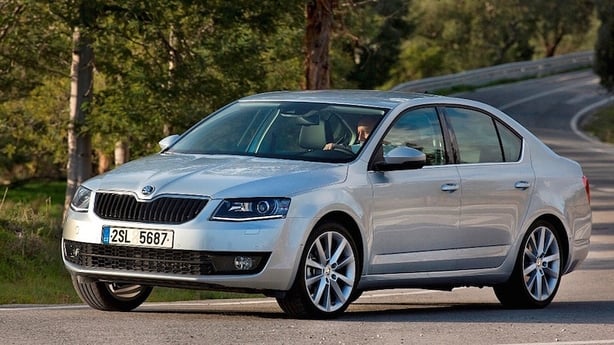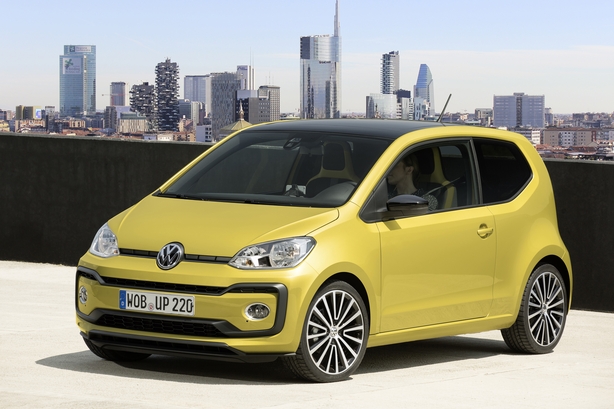It's ironic that as Volkswagen was about to be engulfed by the Diselgate scandal that it had one of the best, most efficient and clean small engines was coming through its range of cars - an engine that finally proved that small was as good big when the technology was right. I've been driving the 1.0 litre engine in two cars - the Skoda Octavia and the Volkswagen Up - and they deserve a wider audience.
It's no great surprise that the three-cylinder turbocharged petrol engine can power a car like the little VW Up but the real eye-opener is when it is fitted to the Skoda Octavia, by any standards the biggest and roomiest of family cars in its price bracket. But the 1.0 litre engine is very much up to the job when the horse power is appropriate for the car - the Up gets 90 horse power and the Octavia gets 115 horse power.
The Octavia has been revised in recent times so this engine adds to its refreshing. It benefits from the fact that may people who might have wanted a Skoda but did'nt necessarily want a diesel now have an option - and an efficient one at that.
It costs from €25,730, has annual road tax of €190, emits 103 g of C02 per kilometre and I managed to get a very respectable 5.2 litres of fuel consumption per 100 kilometres in mixed driving conditions.

The three cylinder engine does pose challenges with the Octavia.
The three cylinder engine does pose some challenges - it is not as refined or quiet and you sometimes have the feeling you are pushing it to a rather modest limit. Getting from 0 to 100 KPH will take a good ten seconds or more.
Then you consider average driving conditions and habits and realise that it performs its tasks very well. The benefits of an Octavia are space, comfort, a very large boot, reliability and keen pricing. The car is not designed to be a performance car for the suburbs or the countryside.
Skoda even did some of my homework for me when, last year, Skoda Ireland estimated the time taken for the average driver to justify paying the price for a diesel Octavia - over a 1.0 litre petrol version - was six years. I think the same equation applies to most other car brands when you are paying a diesel premium of around €2,000 Euros and driving perhaps 15,000 kilometres a year.
I won't say the Octavia was a very fun car to drive but it managed to meet almost every challenge, except that of an interesting interior. Space it may have but, boy, is it lacking in character.
It does, however, offer a good level of standard equipment, such as tinted windows, stability control, stop/start technology, lumbar supports for front seats, Bluetooth and a very practical dashboard and infotainment screen.
This Octavia is a car that appeals because of its frugality combined with relatively green credentials and because its proof that prejudice against small petrol engines is no longer justified. Unless you are carrying heavy loads or a full passenger complement but at least it will carry them in comfort.

The funky High Up is a highly intelligent city car choice.
On the other end of the scale but with the same technological advantage is the Volkswagen High Up - a car with the footprint of a Smart car but with much bigger appeal. There is no point in pretending it is anything other than a two-seater - with the option to temporarily squeeze in any one other than a child.
As a car that zips around the city, offers a driving experience with character and, like the Octavia, offers really good fuel consumption and low emissions, the Up is fun. It has extras like alloy wheels that actually give it a larger car look, despite its short overhang at the front and rear. It also offers, surprisingly, cruise control, a rear warning system and a leather-trimmed multi-function steering wheel. Technology is a bit limited with a smart phone cradle in which to pitch your device and work from there.
I'm a tall driver and I took every centimetre of the driver's seat travel - there was'nt much room left for anyone or anything behind me. However, everything felt front-loaded in the Up - lots of glass area, good seats, clear instruments and a general feeling of spaciousness. The boot, on the other hand, is a much more limited prospect with functional shopping trips perhaps the priority.
The same engine issues arise as with the Octavia. It does feel limited when pushed but it has no issues around town. In fact, I quite liked the slightly raucous note from the engine.
I got about 5.2 litres consumption per 100 kilometres, a good deal of it in town and I have never achieved that with Ford's much-lauded Ecoboost petrol engine. The High Up costs €18,292, road tax is €190 and the emissions are 108 g/km.
It's a highly intelligent city car choice, but check out almost the same car from Seat and Skoda (they are all made together by the VW Group) before making a choice. There may be a price advantage if you can match the standard equipment.


